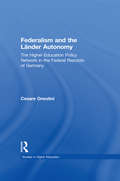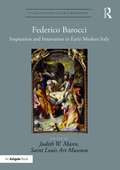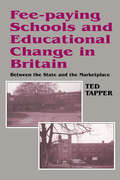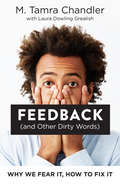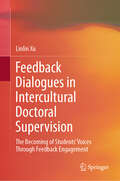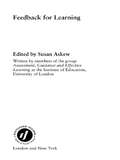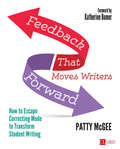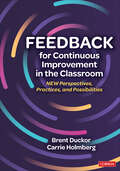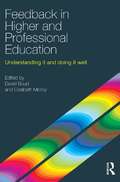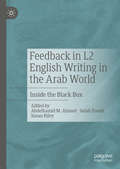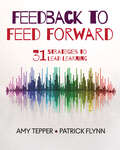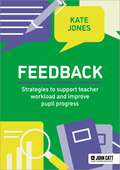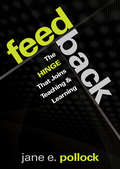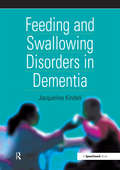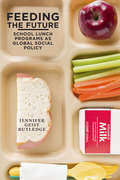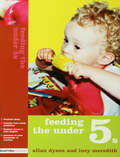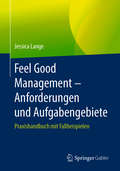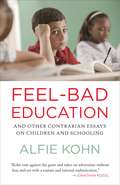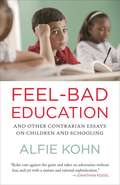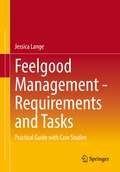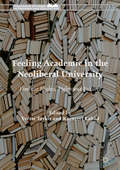- Table View
- List View
Federalism and the Lander Autonomy: The Higher Education Policy Network in the Federal Republic of Germany, 1948-1998 (RoutledgeFalmer Studies in Higher Education)
by Cesare OnestiniAn interesting study of the German higher Education system, examining the development of higher education policies from the post-war years, to the post-unification period.
Federico Barocci: Inspiration and Innovation in Early Modern Italy (Visual Culture in Early Modernity)
by Judith MannReviewers of a recent exhibition termed Federico Barocci (ca. 1533–1612), 'the greatest artist you’ve never heard of'. One of the first original iconographers of the Counter Reformation, Barocci was a remarkably inventive religious painter and draftsman, and the first Italian artist to incorporate extensive color into his drawings. The purpose of this volume is to offer new insights into Barocci’s work and to accord this artist, the dates of whose career fall between the traditional Renaissance and Baroque periods, the critical attention he deserves. Employing a range of methodologies, the essays include new ideas on Barocci’s masterpiece, the Entombment of Christ; fresh thinking about his use of color in his drawings and innovative design methods; insights into his approach to the nude; revelations on a key early patron; a consideration of the reasons behind some of his most original iconography; an analysis of his unusual approach to the marketing of his pictures; an exploration of some little-known aspects of his early production, such as his reliance on Italian majolica and contemporary sculpture in developing his compositions; and an examination of a key Barocci document, the post mortem inventory of his studio. A translated transcription of the inventory is included as an appendix.
Fee-paying Schools and Educational Change in Britain: Between the State and the Marketplace
by Ted TapperExamining the history of access to private education this work sheds light on the interaction of state, society and schooling. Organized historically, much of the analysis concentrates on contemporary political struggles, and evaluates the possibility of a unified educational system.
Feedback (and Other Dirty Words): Why We Fear It, How to Fix It
by M. Tamra Chandler Laura Dowling GrealishA practical and irreverent guide to taking the sting out of feedback and reclaiming it as a motivating, empowering experience for everyone involved. Feedback: the mere mention of the word can make our blood pressure rise and our defenses go up. For many of us, it's a dirty word that we associate with bias, politics, resentment, and self-doubt. However, if we take a step back and think about its true intent, we realize that feedback needn't be a bad thing. After all, understanding how others experience us provides valuable opportunities to learn and grow. Authors M. Tamra Chandler and Laura Grealish explain how feedback got such a bad rap and how to recognize and minimize the negative physical and emotional responses that can erode trust and shut down communication. They offer a new and more ambitious definition of feedback, explore the roles we each play as Seeker, Extender, and Receiver, and introduce the three Fs of making feedback focused, fair, and frequent. You'll also find valuable exercises and strategies, along with real-world examples that illustrate how you can put these ideas into action and join in the movement to fix feedback, once and for all.When it's done right, feedback has been proven to be the most effective means of improving communication and performance for you and your organization. It's too important to give up, and with Chandler and Grealish's help, you'll be able to use it deftly, equitably, and effectively.
Feedback Dialogues in Intercultural Doctoral Supervision: The Becoming of Students’ Voices Through Feedback Engagement
by Linlin XuThis book provides an in-depth understanding of doctoral students&’ feedback engagement, an essential component of feedback dialogues co-constructed with their supervisors in intercultural supervision. Drawing on Bakhtin&’s theory of dialogism, this mixed-methods study explores, from cognitive, affective, behavioural and socio-cultural perspectives, the perceptions and experiences of Chinese international doctoral students&’ engagement with their non-Chinese supervisors&’ written feedback. In particular, it investigates how students engage in both external and internal feedback dialogues, and through which they (re)construct their academic voices as emerging scholars. This book adds to our knowledge of the complex nature of feedback engagement in intercultural doctoral supervision. It offers valuable implications for supervisors, mentors, academic advisors, and academic writing teachers in terms of fostering collaborative, enabling, emancipatory, and culturally reflexive relationships with doctoral students. It also illustrates the tensions and contradictions that doctoral students, especially international doctoral students, may encounter in their studies, making overt the underlying reasons for the tensions and showcasing how their counterparts navigate these tensions. These insights help supervisors and doctoral students reflect on their perceptions and practices, and how to make such tensions productive.
Feedback For Learning
by Susan AskewTeachers may be surrounded by feedback and involved in it every day, but the notion is poorly analysed and poorly used. Feedback for Learning provides an important collection of contributions to the highly topical theme of feedback to support learning.The book spans three major areas which affect all teachers:*young people's learning*teachers' learning *organisational learning.The authors critically examine the assumption that feedback necessarily has positive learning outcomes and describe models and practices which are more likely to result in effective learning at the individual, group and organisational level.
Feedback That Moves Writers Forward: How to Escape Correcting Mode to Transform Student Writing (Corwin Literacy)
by Patty McGee"Patty McGee should be called the ′Writer Whisperer.′ She offers brilliant advice for helping struggling writers, accomplished writers, and all those in between." —Debbie Silver, Co-author of Teaching Kids to Thrive The number one challenge of student writers today isn’t word choice, logic, voice, or even grammar and spelling—it’s buy-in. In Feedback That Moves Writers Forward, Patty McGee shares how to’s for teaching that changes the writing-as-obligation vibe for good. She demonstrates the way feedback can inspire students to reach new heights as writers. With Patty’s help, you learn to: Resign from your position as Corrector-in-Chief and be amazed as students eagerly take over responsibility for refining their writing Apply the research on growth mindset and goal setting, whether you use a writing program or a workshop model Use tone, trust, and language to quicken students’ discovery of their writing identities and take risks when they are stuck Use student work to deliver clear, just-in-time feedback during planning, drafting, revising, and editing Use the online printable forms for delivering customized feedback with just the right wording Balance grading and feedback Help writers reflect so they are better able to apply what they learned about content, craft, and style to their future writing One of the bravest things we can do as teachers is to admit when a long held practice isn’t working. Error-focused feedback is one such practice. So put down the red pen, pick up this book, and learn to say the right thing at the right time to develop fearless, original, and intentional writers—in any content area.
Feedback That Moves Writers Forward: How to Escape Correcting Mode to Transform Student Writing (Corwin Literacy)
by Patty McGee"Patty McGee should be called the ′Writer Whisperer.′ She offers brilliant advice for helping struggling writers, accomplished writers, and all those in between." —Debbie Silver, Co-author of Teaching Kids to Thrive The number one challenge of student writers today isn’t word choice, logic, voice, or even grammar and spelling—it’s buy-in. In Feedback That Moves Writers Forward, Patty McGee shares how to’s for teaching that changes the writing-as-obligation vibe for good. She demonstrates the way feedback can inspire students to reach new heights as writers. With Patty’s help, you learn to: Resign from your position as Corrector-in-Chief and be amazed as students eagerly take over responsibility for refining their writing Apply the research on growth mindset and goal setting, whether you use a writing program or a workshop model Use tone, trust, and language to quicken students’ discovery of their writing identities and take risks when they are stuck Use student work to deliver clear, just-in-time feedback during planning, drafting, revising, and editing Use the online printable forms for delivering customized feedback with just the right wording Balance grading and feedback Help writers reflect so they are better able to apply what they learned about content, craft, and style to their future writing One of the bravest things we can do as teachers is to admit when a long held practice isn’t working. Error-focused feedback is one such practice. So put down the red pen, pick up this book, and learn to say the right thing at the right time to develop fearless, original, and intentional writers—in any content area.
Feedback for Continuous Improvement in the Classroom: New Perspectives, Practices, and Possibilities
by Brent Duckor Carrie L. HolmbergPut feedback to work for everyone to make a difference—now Feedback connects, deepens communication, and helps everyone focus on advancing student learning. What if you could use the dimensions and facets of formative feedback in ways that emphasize authenticity, equity, and care for ALL students? Educators Brent Duckor and Carrie Holmberg show you how to plan, enact, and reflect on feedback practices within lessons and across units using an accessible, comprehensive, and innovative framework that illuminates the path towards equity and excellence for all. With evidence-based research and real classroom examples, Feedback for Continuous Improvement in the Classroom answers: What is formative feedback? How does it influence student outcomes and teacher pedagogy? Why are well-defined learning goals, aligned with rich tasks and progress guides, essential to making feedback truly formative? What are essential facets of teacher, peer, and self-driven feedback? How does feedback work best in whole-class, small group, or individual configurations? What can make written, spoken, and nonverbal feedback modalities more effective—for all? How can focusing on feedback improve learning across all subject matter disciplines? Prompts for self-reflection, videos, vignettes, and scaffolds throughout help readers see how effective feedback can be embedded into classrooms and school communities committed to discovery, growth, and deeper learning.
Feedback for Continuous Improvement in the Classroom: New Perspectives, Practices, and Possibilities
by Brent Duckor Carrie L. HolmbergPut feedback to work for everyone to make a difference—now Feedback connects, deepens communication, and helps everyone focus on advancing student learning. What if you could use the dimensions and facets of formative feedback in ways that emphasize authenticity, equity, and care for ALL students? Educators Brent Duckor and Carrie Holmberg show you how to plan, enact, and reflect on feedback practices within lessons and across units using an accessible, comprehensive, and innovative framework that illuminates the path towards equity and excellence for all. With evidence-based research and real classroom examples, Feedback for Continuous Improvement in the Classroom answers: What is formative feedback? How does it influence student outcomes and teacher pedagogy? Why are well-defined learning goals, aligned with rich tasks and progress guides, essential to making feedback truly formative? What are essential facets of teacher, peer, and self-driven feedback? How does feedback work best in whole-class, small group, or individual configurations? What can make written, spoken, and nonverbal feedback modalities more effective—for all? How can focusing on feedback improve learning across all subject matter disciplines? Prompts for self-reflection, videos, vignettes, and scaffolds throughout help readers see how effective feedback can be embedded into classrooms and school communities committed to discovery, growth, and deeper learning.
Feedback in Higher and Professional Education: Understanding it and doing it well
by David Boud Elizabeth MolloyLearners complain that they do not get enough feedback, and educators resent that although they put considerable time into generating feedback, students take little notice of it. Both parties agree that it is very important. Feedback in Higher and Professional Education explores what needs to be done to make feedback more effective. It examines the problem of feedback and suggests that there is a lack of clarity and shared meaning about what it is and what constitutes doing it well. It argues that new ways of thinking about feedback are needed. There has been considerable development in research on feedback in recent years, but surprisingly little awareness of what needs to be done to improve it and good ideas are not translated into action. The book provides a multi-disciplinary and international account of the role of feedback in higher and professional education. It challenges three conventional assumptions about feedback in learning: That feedback constitutes one-way flow of information from a knowledgeable person to a less knowledgeable person. That the job of feedback is complete with the imparting of performance-related information. That a generic model of best-practice feedback can be applied to all learners and all learning situations It seeking a new approach to feedback, it proposes that it is necessary to recognise that learners need to be much more actively involved in seeking, generating and using feedback. Rather than it being something they are subjected to, it must be an activity that they drive.
Feedback in L2 English Writing in the Arab World: Inside the Black Box
by Susan Riley Abdelhamid M. Ahmed Salah TroudiThis edited book uses case studies to offer a comprehensive picture of the feedback practices and perceptions pertinent to English as a Foreign Language (EFL) writing in the Arab world. It highlights essential themes about feedback in L2 writing in eight Arab countries, and offers a detailed critical analysis of feedback practices and perceptions in six of these: Egypt, Morocco, Oman, Saudi Arabia, Tunisia and the United Arab Emirates. The book will appeal to an international readership of academics, researchers and practitioners interested in EFL writing in the Arab world.
Feedback to Feed Forward: 31 Strategies to Lead Learning
by Amy Tepper Patrick W. FlynnFeedback that works—for leadership that makes a difference. As a leader, you know that feedback is essential to teachers’ growth and development. But crafting the right feedback can be daunting. How do you conduct comprehensive observations, accurately analyze lessons for effectiveness, and develop high-leverage action steps that bring lasting change to teacher practices and student outcomes? This how-to book, designed for leaders in all roles and at all experience levels, provides a dynamic yet practical leadership model focused on precisely those key tasks. Features include Comprehensive explanations of standards and descriptions of discrete core skills Explicit think-alouds, ready-to-use strategies, and field-tested lesson examples Evidence-collection notes—with templates—from live observations Feedback samples across grade levels and content areas Replicable case studies for professional learning Simply inspecting teaching practice through observation might be easy; providing feedback that feeds forward and promotes growth is far more challenging. With this comprehensive learning tool, you’ll use feedback to make the most of your role as a leader of learning—for both teachers and students. Feedback to Feed Forward has been recognized for focusing on practices that have high effect sizes and will help you translate the groundbreaking Visible Learning research into practice. When educators use strategies that have high effects (greater than 0.40), they can accelerate student achievement. The power of the Visible Learning research lies in helping educators understand which factors have the highest impact on student achievement so that educators can begin making strategic decisions based on evidence that will utilize their time, energy, and resources to the best extent possible. The Visible Learning research is based on Professor John Hattie’s unmatched meta-analysis of more than 1,600 research reviews comprising 95,000 studies, involving more than 300 million students—the world’s largest evidence base on what works best in schools to improve student learning. From that research, Dr. Hattie identified more than 250 factors that have an impact on student achievement.
Feedback to Feed Forward: 31 Strategies to Lead Learning
by Amy Tepper Patrick W. FlynnFeedback that works—for leadership that makes a difference. As a leader, you know that feedback is essential to teachers’ growth and development. But crafting the right feedback can be daunting. How do you conduct comprehensive observations, accurately analyze lessons for effectiveness, and develop high-leverage action steps that bring lasting change to teacher practices and student outcomes? This how-to book, designed for leaders in all roles and at all experience levels, provides a dynamic yet practical leadership model focused on precisely those key tasks. Features include Comprehensive explanations of standards and descriptions of discrete core skills Explicit think-alouds, ready-to-use strategies, and field-tested lesson examples Evidence-collection notes—with templates—from live observations Feedback samples across grade levels and content areas Replicable case studies for professional learning Simply inspecting teaching practice through observation might be easy; providing feedback that feeds forward and promotes growth is far more challenging. With this comprehensive learning tool, you’ll use feedback to make the most of your role as a leader of learning—for both teachers and students. Feedback to Feed Forward has been recognized for focusing on practices that have high effect sizes and will help you translate the groundbreaking Visible Learning research into practice. When educators use strategies that have high effects (greater than 0.40), they can accelerate student achievement. The power of the Visible Learning research lies in helping educators understand which factors have the highest impact on student achievement so that educators can begin making strategic decisions based on evidence that will utilize their time, energy, and resources to the best extent possible. The Visible Learning research is based on Professor John Hattie’s unmatched meta-analysis of more than 1,600 research reviews comprising 95,000 studies, involving more than 300 million students—the world’s largest evidence base on what works best in schools to improve student learning. From that research, Dr. Hattie identified more than 250 factors that have an impact on student achievement.
Feedback: Strategies to support teacher workload and improve pupil progress
by Kate JonesStrategies, techniques and ideas come and go in education, but feedback will always be an important aspect of effective teaching, learning and assessment. Feedback should be helpful and actionable, and pupils must embrace it, but the reality is that this doesn't always happen. Pupils receive feedback on a daily basis, from their teachers and peers, so how can we make sure it helps rather than hinders learning? This book aims to answer that key question and provide a wide range of practical examples for the classroom.Feedback: strategies to support teacher workload and improve pupil progress, the latest book by bestselling author Kate Jones, explores a variety of evidence-informed and workload-friendly feedback strategies. Jones examines the ingredients of effective feedback, shows what actionable feedback looks like in practice, explores verbal feedback approaches, advises on peer and self-assessment, and on harnessing technology to support teacher workload. Fascinating case studies reveal how classroom teachers and school leaders across primary and secondary are implementing feedback in their settings.
Feedback: Strategies to support teacher workload and improve pupil progress
by Kate JonesStrategies, techniques and ideas come and go in education, but feedback will always be an important aspect of effective teaching, learning and assessment. Feedback should be helpful and actionable, and pupils must embrace it, but the reality is that this doesn't always happen. Pupils receive feedback on a daily basis, from their teachers and peers, so how can we make sure it helps rather than hinders learning? This book aims to answer that key question and provide a wide range of practical examples for the classroom.Feedback: strategies to support teacher workload and improve pupil progress, the latest book by bestselling author Kate Jones, explores a variety of evidence-informed and workload-friendly feedback strategies. Jones examines the ingredients of effective feedback, shows what actionable feedback looks like in practice, explores verbal feedback approaches, advises on peer and self-assessment, and on harnessing technology to support teacher workload. Fascinating case studies reveal how classroom teachers and school leaders across primary and secondary are implementing feedback in their settings.
Feedback: The Hinge That Joins Teaching and Learning
by Jane E. PollockWorks like an app to close the learning gap! Jane E. Pollock, coauthor of Classroom Instruction That Works, expands on the bestseller’s feedback strategy in this groundbreaking work. While feedback is not a new concept, what is new is using it the way people use computer apps—to set goals, track their progress, and regulate their own learning. With only a slight shift in teaching strategy, this no-cost technique: <p><p> Informs teachers while students are learning, not after <p> Engages and motivates learners <p> Teaches 21st-century skills <p> Helps students understand and meet standards
Feeding and Swallowing Disorders in Dementia
by Jacqueline KindellThis informative manual draws on expert research to highlight the feeding and swallowing difficulties that can occur with dementia. It is also a practical guide that offers potential strategies to manage these problems. Professionals are encouraged to focus on the needs of the individual by providing practical questions that should be asked when making an assessment. This is achieved through a step-by-step process, which allows a worker to observe, document and manage feeding and swallowing difficulties. Forms, schedules and checklists that can be photocopied are provided to aid in implementation. This is a detailed, practical resource which offers support and direction for speech and language therapists, and others with an interest in swallowing problems, working with people with dementia. It includes case studies to illustrate theory in practice, as well as a wide ranging bibliography.
Feeding the Future: School Lunch Programs as Global Social Policy
by Jennifer Geist RutledgeA century ago, only local charities existed to feed children. Today 368 million children receive school lunches in 151 countries, in programs supported by state and national governments. In Feeding the Future, Jennifer Geist Rutledge investigates how and why states have assumed responsibility for feeding children, chronicling the origins and spread of school lunch programs around the world, starting with the adoption of these programs in the United States and some Western European nations, and then tracing their growth through the efforts of the World Food Program. The primary focus of Feeding the Future is on social policy formation: how and why did school lunch programs emerge? Given that all countries developed education systems, why do some countries have these programs and others do not? Rutledge draws on a wealth of information--including archival resources, interviews with national policymakers in several countries, United Nations data, and agricultural statistics--to underscore the ways in which a combination of ideological and material factors led to the creation of these enduringly popular policies. She shows that, in many ways, these programs emerged largely as an unintended effect of agricultural policy that rewarded farmers for producing surpluses. School lunches provided a ready outlet for this surplus. She also describes how, in each of the cases of school lunch creation, policy entrepreneurs, motivated by a commitment to alleviate childhood malnutrition, harnessed different ideas that were relevant to their state or organization in order to funnel these agricultural surpluses into school lunch programs. The public debate over how we feed our children is becoming more and more politically charged. Feeding the Future provides vital background to these debates, illuminating the history of food policies and the ways our food system is shaped by global social policy.
Feeding the Under 5s
by Allan Dyson Lucy MeredithOne young child in every four is overweight and one in ten is obese, some of the reasons for this are: a general lack of interest and understanding of food and cooking junk food being consumed every day a more sedentary school life. As a key issue that needs to be tackled early, starting with the under fives, this book offers: advice and recipe ideas for feeding young children properly ways to improve young children’s understanding of food and nutrition contemporary evidence and policies recommended by expert advisory bodies underlying reasons behind nutritional guidelines and food safety advice, and practical ways to implement them. The authors present all of this in plain English without assuming any prior knowledge of nutrition, food safety or health issues.
Feel Good Management – Anforderungen und Aufgabengebiete: Praxishandbuch mit Fallbeispielen
by Jessica LangeLernen Sie mit diesem Fachbuch den Beruf des Feel Good Managers näher kennenDas Feel Good Management ist ein neues Konzept, welches den Trend in Unternehmen zur Mitarbeiterorientierung ausdrückt. Diese Mitarbeiterorientierung gilt mit Blick auf den stark zunehmenden Wettbewerb auf dem Arbeitsmarkt in Zukunft als zentraler Kompetenzfaktor eines Unternehmens. So sollen Faktoren wie Fachkräftemangel oder der sogenannte War for Talents ausgeglichen werden.Dieses Buch gibt Ihnen einen umfangreichen Überblick über die Anforderungen und Aufgaben eines Feel Good Managers. Dazu gehören unter anderem: MitarbeitermotivationVerbesserung der Arbeitsatmosphäre durch Teambuilding-MaßnahmenSteigerung der ArbeitgeberattraktivitätGrundlagen der MitarbeiterführungPersonalentwicklung und MitarbeiterorientierungKonfliktmanagementSteigerung der MitarbeiterzufriedenheitLangfristige MitarbeiterbindungDas Buch richtet sich sowohl an Feel Good Manager als auch Unternehmer, die Klarheit und Verständnis über die Position und Aufgaben dieses Berufs bekommen und ihr Wissen in zentralen Aufgabenbereichen vertiefen möchten. Darüber hinaus ist dieses Buch auch für Führungskräfte sinnvoll. Denn durch das operative Geschäft kann es oftmals zu kurz kommen, Mitarbeiterbedürfnisse frühzeitig zu erkennen und zu berücksichtigen. Dieses Buch zeigt Ihnen, wie Sie die Vorteile des Feel Good Managements für Ihr Unternehmen nutzen können.Feel Good Management von A-ZDas Buch über Feel Good Management gibt einen einführenden Überblick über die Thematik. Viele Praxistipps helfen bei der Umsetzung im eigenen Betrieb. Im Speziellen werden die folgenden Inhalte behandelt:Einführung ins Feel Good ManagementAufgaben und Anforderungen des Feel Good Managers im ÜberblickWeiterentwicklung einer UnternehmenskulturVerbesserung der internen KommunikationUnterstützung des PersonalmanagementsSelbstmanagement des Feel Good Managers und Unterstützung des betrieblichen Gesundheitsmanagements
Feel-Bad Education
by Alfie KohnMind-opening writing on what kids need from school, from one of education's most outspoken voices Almost no writer on schools asks us to question our fundamental assumptions about education and motivation as boldly as Alfie Kohn. The Washington Post says that "teachers and parents who encounter Kohn and his thoughts come away transfixed, ready to change their schools." And Time magazine has called him "perhaps the country's most outspoken critic of education's fixation on grades [and] test scores." Here is challenging and entertaining writing on where we should go in American education, in Alfie Kohn's unmistakable voice. He argues in the title essay with those who think that high standards mean joylessness in the classroom. He reflects thoughtfully on the question "Why Self-Discipline Is Overrated." And in an essay for the New York Times, which generated enormous response, he warns against the dangers of both punishing and praising children for what they do instead of parenting "unconditionally." Whether he's talking about school policy or the psychology of motivation, Kohn gives us wonderfully provocative--and utterly serious--food for thought. This new book will be greeted with enthusiasm by his many readers, and by teachers and parents seeking a refreshing perspective on today's debates about kids and schools.
Feel-Bad Education: Contrarian Essays on Children and Schooling
by Alfie KohnMind-opening writing on what kids need from school, from one of education's most outspoken voices. Arguing that our schools are currently in the grip of a "cult of rigor"--a confusion of harder with better that threatens to banish both joy and meaningful intellectual inquiry from our classrooms--Alfie Kohn issues a stirring call to rethink our priorities and reconsider our practices. Kohn's latest wide-ranging collection of writings will add to his reputation as one of the most incisive thinkers in the field, who questions the assumptions too often taken for granted in discussions about education and human behavior. In nineteen recently published essays--and in a substantive introduction, new for this volume--Kohn repeatedly invites us to think more deeply about the conventional wisdom. Is self-discipline always desirable? he asks, citing surprising evidence to the contrary. Does academic cheating necessarily indicate a moral failing? Might inspirational posters commonly found on school walls (Reach for the stars!) reflect disturbing assumptions about children? Could the use of rubrics for evaluating student learning prove counterproductive? Subjecting young children to homework, grades, or standardized tests--merely because these things will be required of them later--reminds Kohn of Monty Python's "getting hit on the head lessons." And, with tongue firmly in cheek, he declares that we should immediately begin teaching twenty-second-century skills. Whether Kohn is clearing up misconceptions about progressive education or explaining why incentives for healthier living are bound to backfire, debunking the idea that education reform should be driven by concerns about economic competitiveness or putting "Supernanny" in her place, his readers will understand why the Washington Post has said that "teachers and parents who encounter Kohn and his thoughts come away transfixed, ready to change their schools."
Feelgood Management - Requirements and Tasks: Practical Guide with Case Studies
by Jessica LangeThis practical guide provides the reader with a comprehensive overview and detailed insight into the essential requirements and tasks of a Feelgood Manager. Feelgood Management is a new management concept that expresses the trend towards employee orientation. After customer orientation, employee orientation is considered a central future competence factor in corporate competition, especially in view of the increasing competition on the labor market (shortage of skilled workers, war for talents). The book is aimed at existing and future Feelgood Managers, who on the one hand want to get clarity and understanding about the position and tasks and on the other hand want to deepen or broaden their knowledge in key areas of responsibility. Beyond that, however, this book is useful not only for Feelgood Managers, but for anyone who manages employees. The recognition and consideration of employee needs is a task of personnel management, which is often neglected through no fault of the operational business. The reader is provided with key insights and simple ways to take advantage of Feelgood Management. The book on Feelgood Management provides an introductory overview of the topic. Many practical tips help with the implementation in one's own business. In particular, the following contents are covered: · Introduction to Feelgood Management · Tasks and requirements of the Feelgood Manager at a glance · Further development of the corporate culture Improvement of internal communication Support of the personnel management Self-management of the Feelgood Manager and support of company health management This book is a translation of an original German edition. The translation was done with the help of artificial intelligence (machine translation by the service DeepL.com). A subsequent human revision was done primarily in terms of content, so that the book will read stylistically differently from a conventional translation.
Feeling Academic in the Neoliberal University: Feminist Flights, Fights and Failures (Palgrave Studies in Gender and Education)
by Yvette Taylor Kinneret LahadThis book offers a contemporary account of what it means to inhabit academia as a privilege, risk, entitlement or a failure. Drawing on international perspectives from a range of academic disciplines, it asks whether feminist spaces can offer freedom or flight from the corporatized and commercialized neoliberal university. How are feminist voices felt, heard, received, silenced, and masked? What is it to be a feminist academic in the neoliberal university? How are expectations, entitlements and burdens felt in inhabiting feminist positions and what of 'bad feeling' or 'unhappiness' amongst feminists? The volume consider these issues from across the career course, including from 'early career' and senior established scholars, as these diverse categories are themselves entangled in academic structures, sentiments and subjectivities; they are solidified in, for example, entry and promotion schemes as well as funding calls, and they ask us to identify in particular stages of 'being' or 'becoming' academic, while arguably denying the possibility of ever arriving. It will be essential reading for students and researchers in the areas of Education, Sociology, and Gender Studies.
